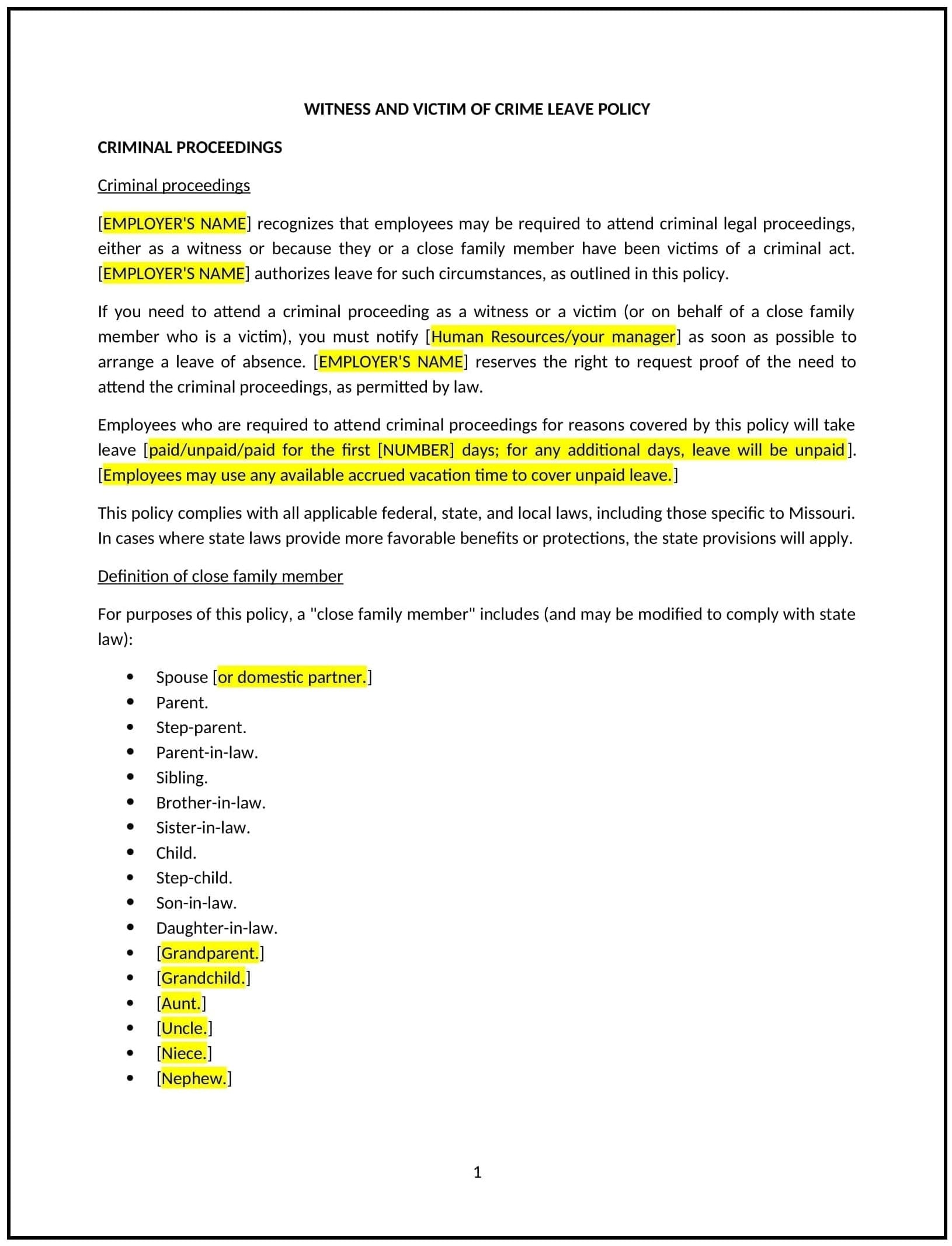Witness and victim of crime leave policy (Missouri): Free template
Got contracts to review? While you're here for policies, let Cobrief make contract review effortless—start your free review now.

Customize this template for free
Witness and victim of crime leave policy (Missouri)
A witness and victim of crime leave policy helps businesses in Missouri support employees who need time off due to their involvement in criminal cases, either as a victim or a witness. This policy outlines the eligibility criteria, the process for requesting leave, and the type of leave available to employees in these situations. It also specifies whether leave will be paid or unpaid and the documentation required to verify the need for leave.
By adopting this policy, businesses can support employees during difficult times, ensure that they are not financially penalized for fulfilling their civic duties, and maintain a respectful and empathetic work environment.
How to use this witness and victim of crime leave policy (Missouri)
- Define eligible situations: Clearly specify the types of situations that qualify for leave under this policy, such as being a direct victim of a crime, being required to testify in court as a witness, or needing to attend court hearings related to a crime in which the employee is involved.
- Set eligibility criteria: Outline the criteria for eligibility, including whether the employee must be full-time, employed for a certain period, or meet any other specific requirements to qualify for leave.
- Specify the type of leave: Indicate whether the leave is paid or unpaid, and whether the employee may be required to use any accrued paid leave (such as vacation or sick leave) before taking unpaid leave.
- Establish the request process: Define the procedure employees should follow to request leave, including how much advance notice they need to provide, the documentation required (such as a subpoena or police report), and the timeframe for submitting requests.
- Address job protection: Clarify whether employees will be protected from retaliation for taking leave, ensuring that they do not lose their job or face negative consequences for exercising their rights under this policy.
- Review regularly: Periodically review and update the policy to ensure it reflects any changes in Missouri state law, federal regulations, or the company’s evolving needs.
Benefits of using this witness and victim of crime leave policy (Missouri)
This policy provides several benefits for businesses in Missouri:
- Supports employee well-being: By providing time off for employees who are victims or witnesses of crimes, businesses demonstrate a commitment to employee well-being and reduce stress during difficult situations.
- Promotes fairness and empathy: Offering leave shows the company’s commitment to treating employees fairly and empathetically, especially during situations beyond their control.
- Reduces absenteeism: A clear and supportive policy can help reduce unauthorized absenteeism by giving employees a clear and legitimate reason to take time off.
- Improves employee retention: Employees are more likely to stay with a company that shows understanding and flexibility during difficult personal situations.
- Ensures compliance with legal obligations: The policy helps businesses align with state laws that protect employees in such situations, reducing the risk of legal issues or employee disputes.
- Enhances company reputation: A business that offers this type of leave is seen as socially responsible, which can boost its reputation and make it more attractive to top talent.
Tips for using this witness and victim of crime leave policy (Missouri)
- Communicate the policy clearly: Ensure all employees are aware of the policy and its provisions. Provide information during onboarding and in employee handbooks to make sure the policy is understood.
- Encourage early notification: Employees should be encouraged to provide as much notice as possible when requesting time off, allowing managers to plan for coverage and minimize disruptions.
- Maintain confidentiality: Handle all requests and documentation confidentially, respecting the privacy of the employee involved in the case.
- Track leave usage: Implement a system for tracking the leave taken under this policy to ensure accurate records and compliance with the company’s leave policies.
- Be supportive and flexible: Consider offering flexible work arrangements or additional support for employees affected by crime, such as counseling or additional paid time off, to help them recover or fulfill their obligations as witnesses.
- Review regularly: Periodically review the policy to ensure it remains up to date with Missouri state law and business needs.